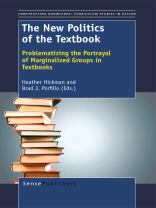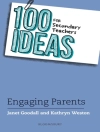In an age of unprecedented corporate and political control over life inside of educational institutions, this book provides a needed intervention to investigate how the economic and political elite use traditional artifacts in K-16 schools to perpetuate their interests at the expense of minoritized social groups. The contributors provide a comprehensive examination of how textbooks, the most dominant cultural force in which corporations and political leaders impact the schooling curricula, shape students’ thoughts and behavior, perpetuate power in dominant groups, and trivialize social groups who are oppressed on the structural axes of race, class, gender, sexuality, and (dis)ability. Several contributors also generate critical insight in how power shapes the production of textbooks and evaluate whether textbooks still perpetuate dominant Western narratives that normalize and privilege patriotism, militarism, consumerism, White supremacy, heterosexism, rugged individualism, technology, and a positivistic conception of the world. Finally, the book highlights several textbooks that challenge readers to rethink their stereotypical views of the Other, to reflect upon the constitutive forces causing oppression in schools and in the wider society, and to reflect upon how to challenge corporate and political dominance over knowledge production.
Содержание
Foreword; Contributors; Introduction; Part I: Problematizing the Portrayal of Marginalized Groups in Textbooks; A Qualitative Understanding of Preservice Teachers’ Critical Examination of Textbook Curriculum Units as Political Text; Finding My Serpent Tongue: Do ESL Textbooks Tap the Linguistic and Cultural Capital of Our Long-Term English Language Learners?; Part II: Math and Science Education: Where Hegemony Can Hide; Women on the Margins: The Politics of Gender in the Language and Content of Science Textbooks; Representation of Diversity in Science Textbooks; Part III: English Language Arts Education: A Story of Exclusion; Handling Heteronormativity in High School Literature Texts; The Open Court Reality: Stories of Success for Unsuccessful Readers; E Pluribus Unum: Elementary School Narratives and the Making of National Identity; Part IV: Social Science & Humanities Education: Representation & Resistance; Uncovering and Destabilizing Heteronormative Narratives in World History Textbooks; The Exclusion and Inclusion of Women in American Government Textbooks; Context and Community: Resisting Curricular Colonization in American History Courses; Textbook Orientalism: Critical Visuality and Representations of Southwest Asia and North Africa; Swept under the Rug; Don’t Ask and Don’t Tell the Lies My Teacher Told Me: A Content Analysis of LGBTQ Portrayals in Textbooks; Invisible Indians: How Political Systems Support the Misrepresentation of Indigenous People’s History and Its Effects on Indigenous Child; Gender Representation in AP Art History Textbooks; Neo-Confederate Ideology & History Textbooks – 1860 to 2010; Afterword.












